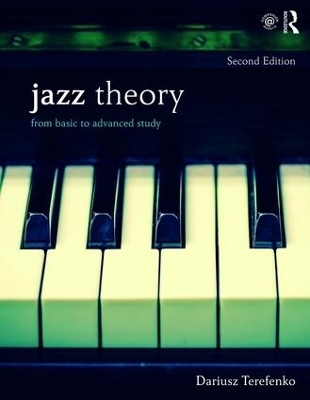
Jazz Theory
Routledge (Verlag)
978-1-138-23510-6 (ISBN)
Jazz Theory is organized into three parts: Basics, Intermediate, and Advanced. This approach allows for success in a one-semester curriculum or with subsequent terms. If students sense that theory can facilitate their improvisational skills or can help them develop their ears, they become more engaged in the learning process. The overall pedagogical structure accomplishes precisely that in an original, creative—and above all, musical—manner.
KEY FEATURES include 390 musical examples, ranging from original lead sheets of standard tunes, jazz instrumentals, transcriptions, and original compositions, to fully realized harmonic progressions, sample solos, and re-harmonized tunes. The completely revamped Companion Website hosts:
46 "Play Along Sessions" audio tracks, offering experiences close to real-time performance scenarios.
Over 1,000 (audio and written) exercises covering ear training, rhythm, notation, analysis, improvisation, composition, functional keyboard, and others.
Recordings of all 390 musical examples from the textbook.
Links: Guide to Making Transcriptions, List of Solos to Transcribe, Selected Discography, Classification of Standard Tunes, and more.
Lists of well-known standard tunes, including a comprehensive list of 999 Standard Tunes – Composers and Lyricists.
NEW TO THE SECOND EDITION are instructors’ tools with answer keys to written and ear-training exercises, 380 rhythmic calisthenics featuring exercises from the swing, bebop, and Latin rhythmic traditions, a new improvisation section, a set of 140 Comprehensive Keyboard exercises, plus an expanded ear-training section with 125 melodic, 50 rhythmic dictations, and 170 harmonic dictations, plus 240 written exercises, 25 composition assignments, and 110 singing exercises.
The paperback TEXTBOOK is also paired with the corresponding paperback WORKBOOK in a discounted PACKAGE (9780367321963).
Dariusz Terefenko is Associate Professor of Jazz and Contemporary Media at the Eastman School of Music, University of Rochester.
Part 1: Basics
1. Music Fundamentals
2. Jazz Rhythms
3. Harmonic Function
4. Four-Part Chords
5. Five-Part Chords
6. The II-V-I Progression
7. Modes
8. Chord-Scale Theory
9. The Blues
10. Improvisation
Part 2: Intermediate
11. Voicing Formations
12. Keyboard and Jazz Chorale Textures
13. Idiomatic Jazz Progressions
14. Bebop
15. Bebop Blues
16. The Confirmation Changes
17. The Rhythm Changes
18. Pentatonics, Hexatonics, Octatonics
19. The Tristano Style of Improvisation
Part 3: Advanced
20. Analyzing Jazz Lead Sheets
21. Phrase Models
22. Song Forms
23. Reharmonization Techniques
24. Post-Tonal Jazz: Atonality
25. Set Classes in Jazz
26. Twelve-Tone Techniques
27. Stylistic Crossovers: Developing a New Jazz Repertory
| Erscheinungsdatum | 13.07.2017 |
|---|---|
| Zusatzinfo | 26 Tables, black and white; 371 Line drawings, black and white |
| Verlagsort | London |
| Sprache | englisch |
| Maße | 210 x 280 mm |
| Gewicht | 1040 g |
| Themenwelt | Kunst / Musik / Theater ► Musik ► Jazz / Blues |
| Kunst / Musik / Theater ► Musik ► Musiktheorie / Musiklehre | |
| ISBN-10 | 1-138-23510-5 / 1138235105 |
| ISBN-13 | 978-1-138-23510-6 / 9781138235106 |
| Zustand | Neuware |
| Informationen gemäß Produktsicherheitsverordnung (GPSR) | |
| Haben Sie eine Frage zum Produkt? |
aus dem Bereich


